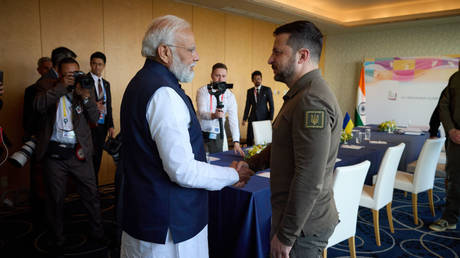CEO Sofia Brandt said Sweden’s parental leave laws mean dads can play a bigger role in their kids’ lives.
Maskot/Getty Images
Sofia Brandt used to work for Accenture before becoming a founder and lives in Gothenburg, Sweden.Brandt shares the aspects of Swedish work culture that might surprise people. Swedes get 480 days of parental leave that can be split between couples and find bragging uncouth.
This as-told-to essay is based on a transcribed conversation with Sofia Brandt, cofounder of the therapy app Ally, who lives in Gothenburg, Sweden. The conversation has been edited for length and clarity.
I worked at Accenture for seven years, primarily with American and Swedish corporations, before founding my own startup, a therapy app called Ally.
While at Accenture, I noticed a lot of differences between Swedish and American working styles. There are also aspects of working life in Sweden that I have observed as a founder that make life easier for parents and create better working conditions.
These are the main aspects of working in Sweden that other cultures might find surprising.
Support for working parents
In Sweden, parental leave has become an incubator for new ideas and people often change career direction during their leave. You get 16 months off work to care for a new child, often at full pay, if your company tops up the government provision. You get 480 days of parental allowance shared between parents per child from the state-governed insurance fund.
For the first 390 days, you get around 80% of your salary. You get a smaller amount for the remaining 90 days, around 15 euros a day. That support gives people time to consider their careers and reflect on ideas while caring for their newborn.
During my 12 months of maternity leave from Accenture, I came up with the idea of our startup. Alongside caring for my newborn, I had long stroller walks and other carved-out time spent thinking about my budding business idea and iterating with my fellow co-founders. Being on leave gives you time to think with some distance from everyday life.
I have been financially supported during my parental leave and as my children grow. As a startup founder, you’re initially paid very little. We coped because of Sweden’s financial provisions for parents.
The subsidized childcare system means we pay less than $125 a month to have both kids at full-time day care, compared to our friends in San Francisco, who pay about $2,900 monthly per child.
Sweden also has “vård av barn”, or VAB, a policy where you can take paid days off to stay home and care for your sick child. There’s an open culture around it, too, with people saying they’re VAB-ing in their out-of-office responses and Slack statuses.
Fathers also have to take three months of parental leave, which is great because it pushes dads to take more of a front seat in their children’s lives and gives working moms more flexibility. Out of the 480 days, at least 90 have to be taken by the parent who hasn’t taken the majority. Most couples try to split it 50/50, but you can split it however you like. This means that one parent can take 390 days, and the other takes 90 days, or you can split it in half or anywhere between.
In 2022, I was about to have my second child. I’d been running Ally for several years, but it wasn’t a good time to take my maternity leave. My husband did the first six months, and I took time off afterward. He got comments, mainly from older people, who thought it strange. But for us, it worked perfectly.
Humble approach to work
While at Accenture, I noticed differences between Swedish and American working styles. In Sweden, work-life balance is important, and what you do in your free time plays a bigger part in your identity, whereas it’s the opposite in the US.
Sweden has a built-in cultural code called “jantelagen,” where everyone is considered equal. Humility is essential, and talking about money is generally off-limits.
In America, individual success is celebrated. You are loud about your wins and celebrate earning money.
Bragging in Sweden and exaggerating your achievements or being overly flashy is risky, as you may appear obnoxious or crude — but it wouldn’t formally jeopardize your job.
When recruiting employees in Sweden, you have to ask yourself whether the candidate is holding back, and in most cases, they are.
You have to push candidates to say what they’ve been doing, and with international recruiters, Swedes might lose out because they won’t talk up their full potential.
My cofounders and I are struggling with “jantelagen.” Our all-female founding team needs to pitch ourselves in this tough economic climate. There’s a fine line between humility and ambition, and talking to international investors with our Swedish nature is challenging.
Flat companies
We built Ally to be non-hierarchical, but that’s not just a startup thing. In Sweden, companies have almost no hierarchy, and everyone has the right to speak up.
You work as a team of individuals, and everybody is accountable. But you must get everybody on board to make a change or decision. It means putting a lot of trust in people to get things done independently. It also creates a strong individual responsibility toward a company’s mission.
Collective bargaining, another tenet of Swedish working culture, prioritizes employee needs and gives more power to the employee.
Many people are trade union members, and employers often encourage it. With the union comes greater worker power and expertise in negotiating pay, benefits, and hours, rather than having to fend for yourself and negotiate independently.
Having seen it from both sides, many of these innately Swedish traits help build sustainable businesses over time and safeguard the interests of the employer and employee so everyone can work together positively.





+ There are no comments
Add yours